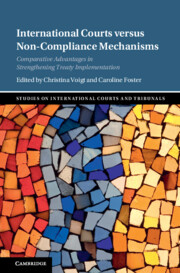A frequent lament concerning international courts is that they are ineffective, lacking coercive measures against non-compliers. Even States that will generally comply may more likely refuse if they suspect that unwilling States shirk their obligations without consequence.
Not so, argue Caroline Foster and Christina Voigt, editors of this fascinating collection of essays on ‘in-house’ non-compliance mechanisms. Sanctions often do not enhance compliance, for States are often willing to comply with their international legal obligations but find themselves uncertain or unable to do so. A range of ‘weak’ non-compliance mechanisms can foster compliance not by punishing but by facilitating compliance. They help clarify treaty obligations, provide authoritative interpretations, render advisory opinions, uncover and alleviate compliance challenges – and may help resolve disputes among States.
The chapters combine to move the research frontier forward. The intriguing questions concern not only whether States comply absent sanctions, but why and when they do – and how non-compliance mechanisms may contribute to these processes. This volume by Foster and Voigt brings attention to these important issues of comparative institutional analysis, drawing on a range of specialists who supplement their own widely recognised expertise.
Foster and Voigt use the case studies to suggest thought-provoking hypotheses prone for further testing. For instance, non-compliance mechanisms are more likely to contribute to compliance towards global public goods. Indeed, States may prefer non-compliance mechanisms when the interests are more broadly shared, rather than agree to more independent courts and tribunals. Other factors that may render non-compliance mechanisms beneficial are when there are sufficiently powerful domestic ‘compliance constituencies’, and when public, trustworthy information about other States’ compliance is decisive.
Foster and Voigt underscore the need to better understand how non-compliance mechanisms and more formal international courts or tribunals may interact to promote – but also hinder – compliance. And paradoxically, they observe that non-compliance mechanisms may sometimes be more effective than more formal international courts and tribunals, precisely because the procedures are less adversarial, and obligations are not legally binding. Sometimes weakness is strength.

